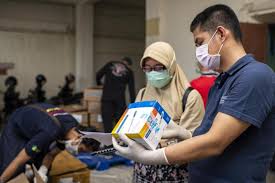Coronavirus has disrupted life-saving vaccinations, health services: UNICEF

New York: UNICEF has expressed concern over the disruption of immunization and basic health services resulting from efforts to contain coronavirus, highlighting that children from the poorest families in countries affected by conflicts and natural disasters are at the greatest risk.
In a statement, UNICEF Executive Director Henrietta Fore said that health services were overstretched with the diversion of health workers to support the response to the pandemic.
“Physical distancing is leading parents to make the difficult decision to defer routine immunization”, Ms. Fore said, adding that flight cancellations and trade restrictions have “severely constrained access to essential medicines, including vaccines”.
UNICEF said it is “particularly concerned” about countries battling measles, cholera or polio outbreaks while simultaneously responding to COVID-19 cases. Afghanistan, the Democratic Republic of Congo, Somalia, the Philippines, Syria and South Sudan fall into that category.
Not only would such outbreaks tax already stretched health services, they could also result in more deaths and greater suffering.
“At a time like this, these countries can ill-afford to face additional outbreaks of vaccine-preventable diseases”, the UNICEF chief asserted. “The message is clear: We must not allow lifesaving health interventions to fall victim to our efforts to address COVID-19”.
UNICEF said it is committed to supporting basic health care and immunization needs in the worst affected countries in a way that limits the risk of COVID-19 transmission, by working to ensure adequate vaccine supplies in countries that need them.
The agency said it is working with global vaccine suppliers to ensure production, and providing support to governments to maintain vaccine supplies during the pandemic.
While Governments may have to temporarily postpone mass vaccination campaigns to ensure that delivering immunizations does not contribute to spreading the coronavirus, UNICEF “strongly recommends” that Governments begin “rigorous planning now”, to intensify immunization programmes once the pandemic is under control.
“These vaccination activities must focus on children who will miss vaccine doses during this period of interruption and prioritize the poorest and most vulnerable children”, Ms. Fore explained.
To successfully roll-out an effective vaccine against COVID-19, when it becomes available, immunization programmes must remain robust and accessible to those that most need inoculations.
“As the world’s biggest buyer and supplier of vaccines, UNICEF will continue to play a pivotal role in supporting governments’ current and future immunization efforts”, the UNICEF chief concluded.
Meanwhile, as nationwide school closures disrupt education for more than 80 per cent of students around the world, UNICEF announced that it would scale up support in 145 nations to help learning continue, safely.
“It is an unprecedented situation and unless we collectively act now to protect children’s education, societies and economies will feel the burden long after we’ve beaten COVID-19”, said Robert Jenkins, UNICEF Global Chief of Education. “In the most vulnerable communities, the impact will span generations”.
Based on lessons learned with the school closures in response to the Ebola epidemics of recent years, he said UNICEF maintains that the longer children stay away from school, the less likely they are to ever return.
Giving children alternative ways to learn also rebuilds a routine, which is critical to the coronavirus response.
UNICEF said it has allocated $13 million to support Governments and education partners to develop plans for a rapid, system-wide response to include alternative learning programmes and mental health support.





